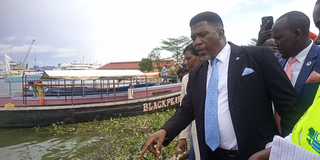Nakawa leaders decry poor waste management on Port Bell lake shores

Nakawa East MP, Mr Ronald Balimwezo, together with other local leaders, inspecting Port Bell shores of Lake Victoria in Nakawa Division on April 17, 2023. PHOTO | DOROTHY NAGITTA
What you need to know:
- The 2021 World Air Quality report ranked Kampala among the most polluted cities with pollution levels exceeding the World Health Organization (WHO) cut-offs by five to seven times.
As the world awaits to commemorate Earth Day on April 22, leaders from Nakawa Division have called on the public and government to fight poor disposal of wastes especially in the lake in order to fight climate change and diseases related to poor sanitation.
While speaking at a media briefing on Monday at Port Bell shores of Lake Victoria in Nakawa Division, area leaders led by Mr Ronald Balimwezo, the Nakawa East MP, said lakes, especially Lake Victoria have been contaminated with plastics and lead from industries hence causing a crisis on humans and the environment.
Mr Balimwezo said that 80 per cent of diseases Ugandans are suffering from is caused by poor sanitation.
“Kampala only generates about 2500 tons of wastes but KCCA and its private stakeholders collect only 1300 tons from 48 and 54 zones and you find more than 1200 tons end up in trenches and others are burned away hence causing air pollution,” he said.
The 2021 World Air Quality report ranked Kampala among the most polluted cities with pollution levels exceeding the World Health Organization (WHO) cut-offs by five to seven times.
Mr Balimwezo warned companies with direct influence on lakes which do not have recycling plants especially those producing plastics, to get them before the enforcement starts.
“We are not going to tolerate such impunity. We are going to tighten the regulations and the culprits will be punished. We shall not allow investors to come here to make money and go and leave our lake contaminated,” Mr Balimwezo said.
He added that the funds used by the National Water and Sewerage Corporation (NWSC) to produce water for last seven years has been doubled due to contamination of the lake and this is because of contamination from industries that have direct influence on the lake.
Recently the National Environment Management Authority (NEMA) issued fines of up to Shs 3,000,000 to a person who refuses to protect a lakeshore in accordance with the regulations.
Ms Fatumah Naigaga, the councilor of the Port Bell zone, appealed to the government to provide free sewerage trucks to empty their toilets saying that it is expensive for locals to manage.
“We managed to build toilets but when they get full, our people don’t have money to get trucks to empty them and in so doing, when it rains people open the toilet sewerage which goes directly into the lake while others practice open defecation which is dangerous to our health,” she said.
In addition, Mr Godfrey Luyombya, the speaker of Nakawa urban council asked the authority to enforce a Cabinet decision of not collecting money from the urban poor living in slum areas for their garbage.
Actions
Mr Balimwezo said they intend to develop clusters in homesteads and sensitise people on the effects of poor waste management.
Ms Hellen Kasujja, the Executive Director of Community Integrated Development initiative (CIDI), an organization aiming at protecting the environment has provided a five-day free waste management service to the community of Port Bell and among them includes empting people’s toilets.


